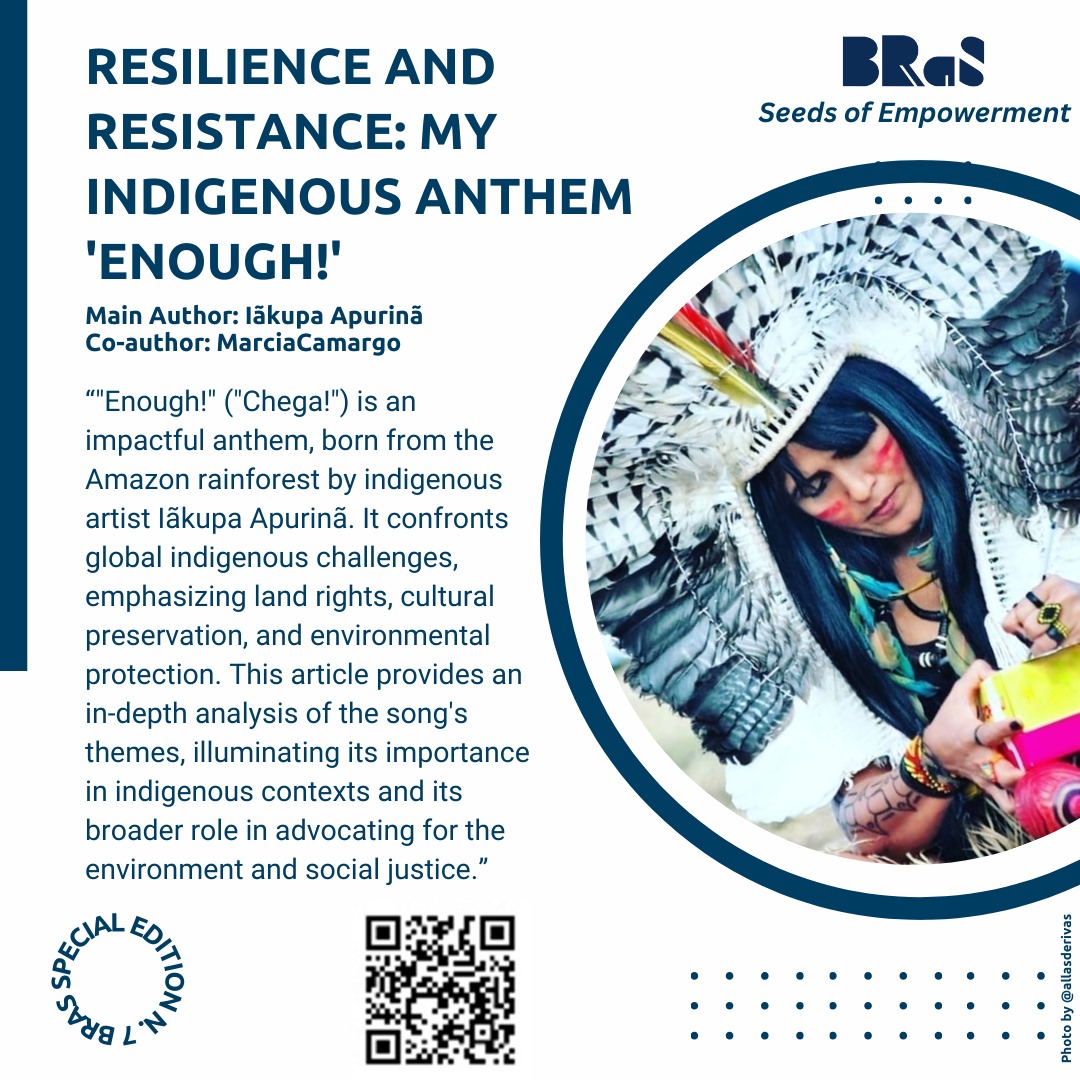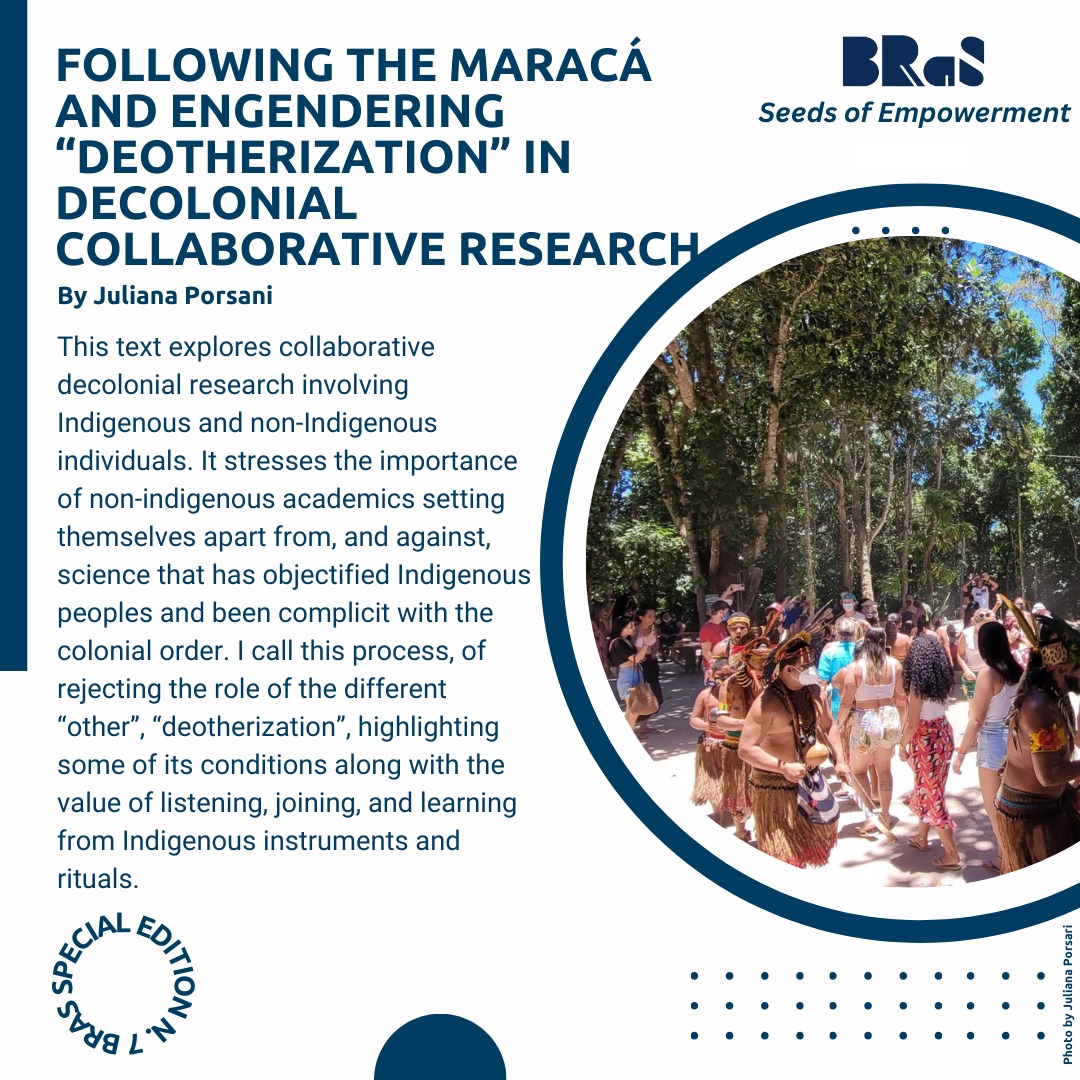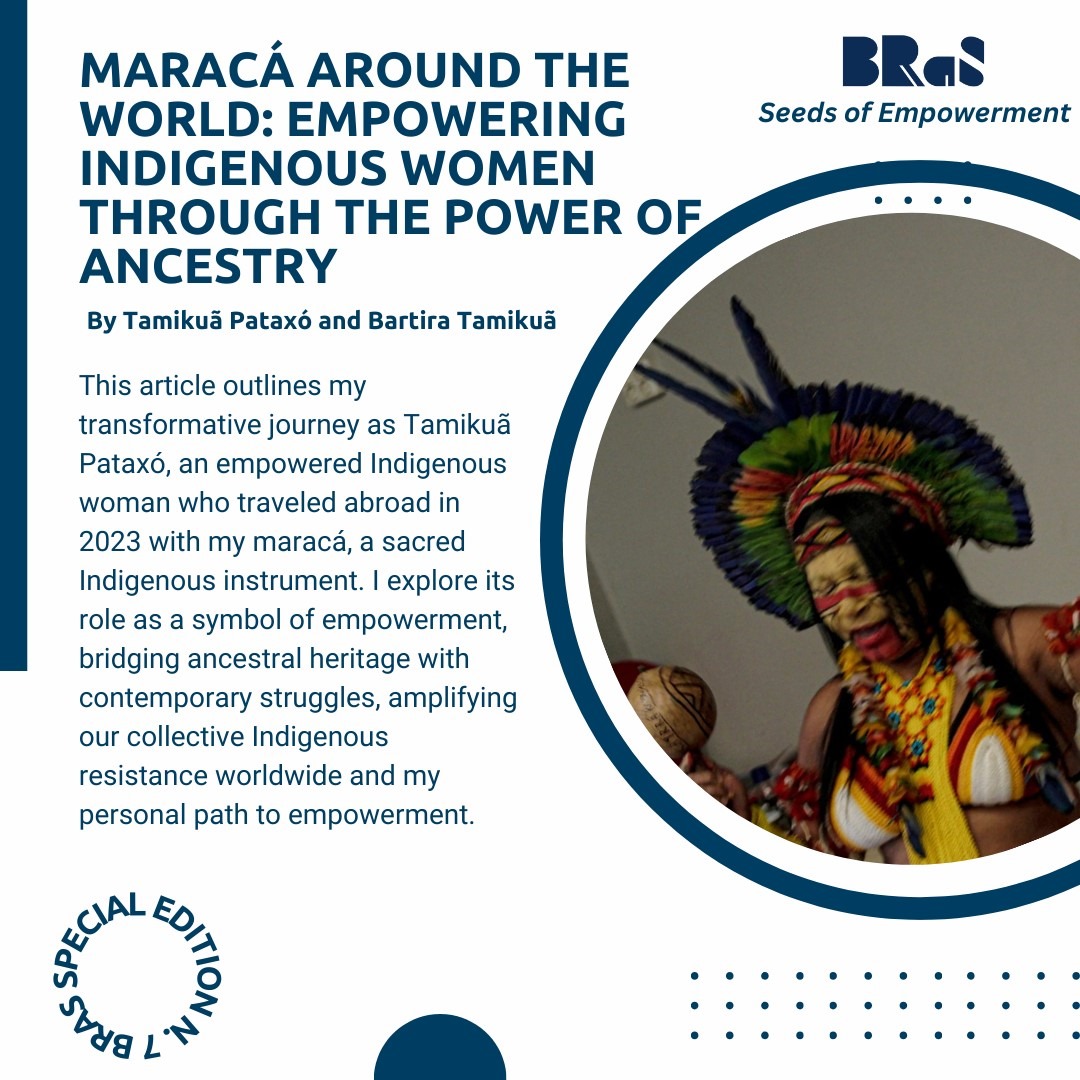by Danielle Ferreira Medeiro da Silva de Araújo*, Sarah Carime Braga Santana**, Victória Sara de Arruda***, Walkyria Chagas da Silva Santos Guimarães****
Translation by Lucas Thixbai Fraga
Reviewed by Matheus Lucas Hebling
Special Edition – Women of Brazils: “Black women (Dandaras) and the struggle for an anti-racist education: Reflections on the impact of the “Enegrecendo a Academia” Project”
The third text of our Special Edition (SE) No. 6 – Women of Brazils deals with the Dandaras Collective. The four authors of this text are part of this Collective and bring relevant information about its formation and struggle to act for the effectiveness of the quota policy. Enjoy the reading!!
Claudia Pires de Castro and Helena Vetorazo
Introduction
““Não deixem calar a nossa voz não!
Re-vo-lu-ção”
(Cota não é esmola – Bia Ferreira)
The four authors of this text are black academics and professors women, who integrate the Dandaras Collective, which was formed in 2018, formed mostly by black women, with the main objective of acting for the effectiveness of the quota policy[5] through the monitoring of candidates in all stages of the selection process of graduate programs at the Federal University of Sul da Bahia (UFSB), and later the project gained national amplitude.
In 2019, Danielle Araújo and Walkyria Chagas, inspired by the difficulties faced to access the graduate course, launched the course “Enegrecendo a Academia: escrita e publicação de textos acadêmicos[6]“, in partnership with the Graduate program in Racial Ethnic Relations (PPGER/UFSB), to instrumentalize the candidates in their preparation for graduate school, thus strengthening the instruments of struggle and resistance against racism (Araújo, 2019; Chagas, 2020).
In 2020, the Dandaras Collective put into practice the dream of making the monitoring project available and aiming to organize the activities held a call for new participants. The call attracted interested parties from different Brazilian states, gathering a new team of 12 members, focused on building a new format for the course “Blackening the Academy”, and thinking about mentoring for the elaboration of Master and Doctoral research projects. Furthermore, the project helped candidates who aimed to enter graduate programs in different regions of Brazil and counted the participation of mentoring Professors from several states.
The objective of this text is to present an experience report on the systematization of data from the Project Blackening the Academy and present the next steps of a collective that keeps moving to build an anti-racist education. With a qualitative approach and using the methodology of bibliographic and documental research, this work presents a brief theoretical discussion on epistemic racism and the need for plurality within the academic field and presents the data of the activities carried out between 2020 and 2022.
Epistemic racism and new reconfigurations in the process of knowledge construction
Lélia Gonzalez wrote in the 1980s that we, the black population, are represented as beings who lack intellectual capacity and, following this logic created by the white elite, part of society sees as natural the persecution suffered by black people. That is, for us blacks, society “reserves” the place of subalternity, exploitation, and manual labor, and at the same time disqualifies our intellectual production (Araújo; Chagas, 2020).
Araújo, Góes, and Santos (2019) state that the construction of education as a value, which permeates the process of socialization of children and adolescents of African descent in the country involves integrated social policies, formal quality education based on contextualized content that values the ethnic-racial-cultural plurality, and that proposes to be transformative, reflective and critical of unequal realities.
Munanga (2005) questions what would be capable of reversing the prejudiced framework that impairs the education of black people, and indicates education as an effective path to deconstruct the myth of the superiority of white people and inferiority of black people, being necessary to mobilize forces to combat racism.
What we are questioning is a process of knowledge production that for centuries subjugated knowledge outside the Eurocentric sphere, which instituted epistemic racism (Santos; Menezes, 2010). Rethinking from within the Academy the process of entering the spaces of knowledge production is established as a format of struggle, which strengthens the revisiting of the history and memory of the black population in a protagonist role of producer of knowledge, resistance, and ingenuity (Araújo, Santos, Fernandes, et. al., 2020).

Blackening the Academy Project – Construction of Research Design: from 2020 to 2022
The Dandaras Collective contributes significantly to personal and professional growth and especially to actions aimed at the black movement and its ramifications. Therefore, understanding this constructive role is that it was necessary to collect data relating to each of the actions organized, managed, and executed by him since it is from these data that we get the real dimension of the magnitude provided by the Collective. It is worth noting that only in 2020 were the classes of the course made available on Youtube.
In quantitative terms, the results of the project can be presented in the table below:
|
Years |
2020 | 2021 | 2022 |
|
Approved Projects |
66 | 57 | 34 |
|
Participants in classes |
Around 70 | Around 40 |
—- |
|
Views on Youtube |
Around 240 | —- | —- |
| Opening Class | 391 views | —- |
—- |
|
Participants in classes along the course |
1522 | —- |
—- |
|
Advisors |
19 | 22 |
23 |
| Concluded Projects | 15 | 24 |
34 |
| Approved in master’s and doctoral selective processes | 6 (only 16 people answered the survey); 70% advanced in stages compared to the previous year. | 13 (only 22 people answered the survey) |
8 (they are participating in selective processes); only 40% of the students answered the survey. |
Source: Dandaras Collective, 2020, 2021, 2022. Made by authors.
In general, the Project was considered by the participants during 2020, 2021, and 2022, as essential for the implementation of affirmative policies in graduate studies in Brazil. Practically all the advisors pointed to the need for its expansion and strengthening.
Most of the participants declare that they were able to understand how to prepare a project assertively and efficiently through the classes offered by the members of the collective, which approach, in a general manner, the primordial issues for the preparation of a research project, many improved their academic writing and came to understand how the selective process for graduate studies works, some learned to organize themselves better and others understood that it is possible to be approved in graduate programs. It was important for the participants to face the challenge collectively, breaking the personal and common limitations in the journey.
Also in 2020, we participated in the organization of the II Black November Journey, which was held within the II Contemporary Black Research Colloquium, with the theme “Blackening the Academy and the Arts”, an action that culminated in 2022 in the publication of the first physical book of the Collective, “Blackening the Academy and the Arts: Dialogues on epistemic racism, anti-racist teaching, black feminisms, and subalternate peoples”, aggregating the best papers presented in the Working Groups of the event.
Never-ending, always on the move: indicating the next steps
In addition to the actions presented, the Dandaras Collective actively participates in the construction of the quota policy of the Graduate program in State and Society (PPGES), and from their demands managed to modify the form of entry of quota holders, with the effective occupation of vacancies that are intended to quotas, since only the reservation of vacancy has not guaranteed the entry of historically excluded populations (Araújo and Chagas, 2021); reservation of spaces for quota Professors in the selection processes; and, study about the creation of a hetero-identification commission, to help in the impediment of frauds in the use of the quotas.
In 2021 we rethought the course “Blackening the Academy” with a more flexible format, considering that the pandemic has changed a lot the lives of the members themselves. Also, as a result of 2021, two founding members (Danielle Araújo and Walkyria Chagas) defended their theses in PPGES, being the first women to receive a doctoral degree in the Program.
We need to advance more and, as black women who live in an Academy with colonizing thoughts, we reflect that there is still much to fight for. Following the footsteps of the ancestral Dandara[7], we intend to bring the quilombo on, that is, to add more hands to our fight, interfering in modifications in the edict of the PPGES and other programs, such as:
-
a) the inclusion of the Gypsy Peoples in the Affirmative Actions;
-
b) equal division of vacancies destined for foreign students for people from African countries and Latin American countries;
-
c) implementation of free courses in languages to aid proficiency, especially for quota students;
-
d) creation and institutionalization of an Affirmative Action and permanence Program for graduate students;
-
e) participation in masters of knowledge in classes, events, and qualification boards and dissertation and thesis defense;
The purpose of presenting these demands is not to lose sight of the efforts that have been made by the Dandaras Collective for access to an anti-racist education to be effective. Far beyond constructing an intellectual document, sharing serves as an action guide/”escape route” for other movements to implement in Postgraduation Programs actions that enable access and change in the reality of black men and women in our country, which is still marked by unequal access and educational asymmetries.
[5] According to Federal Law 12,711/2012, there is a guarantee that 50% of enrollments per course and shift in federal universities and federal institutes of education, science, and technology will be reserved for students coming entirely from public high schools, in regular courses, or youth and adult education. The other 50% of the vacancies remain open to wide competition (Translator’s note).
[6] In English: “Blackening the Academy: writing and publishing academic texts”. We prefer using the English title along the text.
[7] Dandara dos Palmares was and still is a mysterious character! In white historicity is beaded her suicide when she was arrested and her performance as a black warrior and wife of Zumbi dos Palmares in mid-1654. Here, we would like to point out that, Dandara dos Palmares, was a great leader and a heroine, she settled in a period of colonization, and he was an important figure in the Palmares quilombo so that an alternative civilization could be created there. A black woman insubmissive to dehumanization fought for freedom and turned death into a way to remain free. With this, its name, representativeness, and importance remain alive in the history/memory of the black population and inspire other women in the process of resistance to racism.
References
ARAÚJO, D.F.M.S. O papel das normas legais para a transformação social: revisitando a teoria da tridimensionalidade do Direito. In: Inovação e produção de Direito. Orgs: CONTRERAS, E; FILPO, K; LIMA. M. Rio de Janeiro: Àgora21.2018.
ARAÚJO, D.F.M.S.; MARQUES, J.B.M. Complexidade e transdisciplinaridade: novos caminhos para o estudo das normas legais. Revista Mosaico. v. 9. n. 1. 2018. Disponível: http://editora.universidadedevassouras.edu.br/index.php/RM/issue/view/144. Acesso: 20 Ago. 2020.
ARAÚJO, Danielle Ferreira Medeiro da Silva de; SANTOS, Walkyria Chagas da Silva; FERNANDES, Alexandre de Oliveira; CAMPOS, Leonardo Lacerda. História, memória e ressentimento: revisitando a trajetória de exclusão da população negra no Brasil. Revista Latino-americana de Estudios en Cultura y Sociedad –RELACULT, v. 06, ed. especial, mar., 2020.
ARAÚJO, Danielle Ferreira Medeiro da Silva de; SANTOS, Walkyria Chagas da Silva. Juventude negra, educação e direitos humanos: um relato de experiência sobre a atuação do Coletivo Dandaras na UFSB. Juventude.BR, Rio de Janeiro: Centro de Estudos e Memória da Juventude-CEMJ, 18ª edição, ano 14, 2019.
ARAÚJO, Danielle Ferreira Medeiro da Silva de; GÓES, Eva Dayane Almeida; SANTOS, Walkyria Chagas da Silva. Da casa grande à universidade: uma análise sócio-jurídica do trabalho doméstico e do acesso ao direito fundamental à educação no Brasil. Rio de Janeiro: Ágora 21, 2019.
ARAÚJO, CHAGAS. Relato de experiência do Curso “Enegrecendo a Academia: escrita e publicação de textos acadêmicos. Negras escrevivências, interseccionalidades e engenhosidades: educação e políticas afirmativas /. – XI COPENE – Congresso Brasileiro de Pesquisadores/ as Negros/as, 9 a 12 de novembro de 2020. – Organização: Paulo Vinicius Baptista da Silva, Nathalia Savione Machado, Neli Gomes da Rocha … [et al.]. – Curitiba: Universidade Federal do Paraná, 2020.
ARAÚJO, Danielle Ferreira Medeiro da Silva de; GÓES, Eva Dayane Almeida; SANTOS, Walkyria Chagas da Silva. Preto no branco: considerações sobre a Política de Cotas. TEIXEIRA, E. F.; OLIVEIRA, D. S.; MORAIS, G. R. T.; SENA, L. (Orgs.). Direitos Sociais: Reflexões e Desdobramentos. 1º Ed. Curitiba: Editora Appris, 2021. v. 2. 431p . ISBN 978-65-250-1198-1
GONZALEZ, Lélia. Racismo e sexismo na cultura brasileira. Revista Ciências Sociais Hoje. Anpocs, 1984.
JEAN, Bosco Kakozi Kashindi. Unbutu como ética africana, humanista e inclusiva Universidade do Vale do Rio dos Sinos – UNISINOS, ano 15. nº 254, vol. 15, 2017.
MUNANGA, Kabengele (Org.). Superando o Racismo na escola. 2a ed. rev. Brasília: Ministério da Educação, Secretaria de Educação Continuada, Alfabetização e Diversidade, 2005.
SANTOS, B. S.; MENESES, M. P. (Org.). Epistemologias do Sul. São Paulo: Cortez, 2010.
UNIVERSIDADE FEDERAL DO SUL DA BAHIA – UFSB. Plano Orientador. Itabuna, Porto Seguro, Teixeira de Freitas, 2014. Disponível em: < https://ufsb.edu.br/wp-content/uploads/2015/05/Plano-Orientador-UFSB-Final1.pdf >. Acesso em 30 de Ago. 2021.
* Danielle Ferreira Medeiro da Silva de Araújo is a Ph.D. candidate and Master’s degree holder in the Graduate Program in State and Society at the Federal University of Southern Bahia (UFSB). She is a professor of Law at Pitágoras College in Eunápolis, BA. Maria is also a member of the research group Paidéia – a transdisciplinary research laboratory on integrative methodologies for education and social management, and a member of the Dandaras Collective. She is a researcher at the Latin American Center for Studies on Culture – CLAEC. Email: dannymedeiro@hotmail.com.
** Sarah Carime Braga Santana is a Ph.D. candidate in Linguistic Studies at the Federal University of Uberlândia. Email: sarah.braga@live.com.
*** Victória Sara de Arruda is a Master’s degree candidate in Education at São Paulo State University-UNESP. Email: victoria.arruda@unesp.br.
**** Walkyria Chagas da Silva Santos Guimarães is a Professor at the Law School of the Federal University of Tocantins (UFT). Holds a Ph.D. from the Graduate Program in State and Society (UFSB). Currently pursuing a PhD at the Graduate Program in Law (UnB). Member of the Dandaras Collective and Coordinator of the Study Group De(s)colonizando mentes femininas em territórios Afrodiaspóricos: construção coletiva de nova metodologia (CLAEC). Email: kyriachagas@yahoo.com.br.
Guimarães, Danielle Ferreira Medeiro da Silva de Araújo, Sarah Carime Braga Santana, Victória Sara de Arruda and Walkyria Chagas da Silva Santos. 2023. "Black women (Dandaras) and the struggle for an anti-racist education: Reflections on the impact of the “Enegrecendo a Academia” Project". Brazilian Research and Studies Blog. ISSN 2701-4924. Vol. 4 Num. 3. Available at: https://www.bras-center.com/black-women-dandaras-and-the-struggle-for-an-anti-racist-education-reflections-on-the-impact-of-the-enegrecendo-a-academia-project/, accessed on: December 18, 2025.








